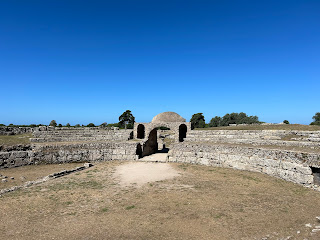I am old enough to remember Sophia Loren when she was super famous in Hollywood. Her beautiful face, her sultry air, her marriage to Carlo Ponti. Many years later, quite by chance, I saw her standing outside of The Strand Bookstore in New York City. No makeup. She was still beautiful. And taller than I expected.
Not many people know but she was born and lived in the tiny town of Puzzuoli, Italy, with her mother, her grandparents, an aunt and two uncles during World War II. Puzzuoli is famous because it is built on top of one of the most active, yet hidden, supervolcanos--the Campi Flegrei. "Campi" means "fields." "Flegrei" means "on fire." The land is never still and constantly moves up and down.
In fact during the 16th century, in 1538, the earth cracked open and lava shot out. A 430 foot mountain was formed in one night. Literally, people went to sleep with no mountain and woke up the next morning with a mountain.
Recently Puzzuoli suffered another earthquake, which closed down an archaeological dig. The Italians have been in the process of restoring the Flavian Amphitheater, the third largest Roman amphitheater in Italy. Experts believe that this amphitheater was built by the same architects who built the Roman Colosseum. We came to Puzzuoli to see it. We try to convince the gatekeepers to let us in, just for a peek, but no go. It is too dangerous. Too volatile.
Instead we spend the morning traipsing around another site--Ambulatio Villa, an ancient ruin that dates back to the first century AD. At first, the experts thought the ruins were thermal baths, but as they excavated more of the area, they realized the ruins were a typical Roman villa, the home of some mega wealthy people. Like other villas, the structure was on the side of a hill, on six different levels or terraces, that cascade to the sea.
I often have difficulty making sense of any ruins, but archaelogists insist they can tell a lot about how people lived 2400 years ago by analyzing what is left behind.
This is what I see:
A large complex made of stone with multiple staircases that connect the various levels.
I see some exquisite mosaics on the floor that are still there:
I see the remnants of frescoes that decorated the walls of the villa. Some even still have evidence of color:
What I'm most impressed by, however, is the evidence of a communal bathroom with running water. Who knew?
One of the things you realize is how connected ancient people were to nature. The ruins evidence patios and outside porticos. The Romans loved to bathe in the sea. There were gardens with vegetables and flowers.
And what is Theo looking at? First he becomes particularly interested in a statue of one of the Roman Gods. Does he think the naked man is real? Theo dutifully goes over and sniffs the base but soon loses interest.
Then Theo spots the most incredible sight: a tree is growing upside down, hanging from the ceiling. I have no explanation for how that is possible. It just is.
Theo can't wait to go over and investigate. He tries to squeeze himself between the rungs of the barrier that is there to keep people and cats away from the tree. It is a tight squeeze. Theo has imbibed a lot more snacks lately. He manages to get about half way through, but he gets stuck, half in and half out.
"Should we help him?" I ask Dan.
"Theo, it's too tight. Try and back out."
Using his back paws, he jerks his body backward. Slowly, he extricates himself from the barrier trap. He walks around in a few circles as if he's considering his next move.
I want to say--it's not worth it, but before I can say a word, he stares at that tree, begins pumping and I know what is about to happen--he takes a flying leap over the barrier and ends up on the other side.
"Theo, this is a protected site. Don't do anything . . ."
Theo has a one track mind. He disappears under the tree for what seems like hours (truthfully it is only minutes) and when he emerges, if he had the proper face muscles, he would be wearing a smile.
"What were you doing under there?"
Ignoring my question, Theo leaps back over the barrier and stands beside his beleaguered parents looking totally innocent.
"Theo."
"I had to do it, see?"
“You’re becoming more like a teenager everyday.”
He shrugs.
And that’s not a good thing.






































